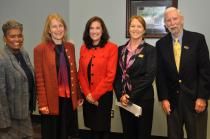On Wednesday, Nov. 17, Penn State Abington hosted the semester's second event of the think-tank series "Penn State Abington Examines." The concerning topic that evening was education -- "The State of Our Schools: Do We Need Superman?" Four successful leaders in the field of education discussed the questionable state of our country's educational system -- a timely event due to the October release of the documentary "Waiting for Superman," by Academy Award-winning director Davis Guggenheim (director of "An Inconvenient Truth"). The film addresses the subject of our failing public schools.
According to the film, the statistics are harrowing: among 30 developed countries, the United States is ranked 25 in math and 21 in science. Every other category is declining as well, except one -- American kids rank number one in confidence. Who or what is to blame? And how do we fix it? Is our only hope Superman?
"We don't have time to wait for superman," said panelist Naomi Booker, CEO of Global Leadership Academy, a Philadelphia charter school. Booker came to the table with decades of educational experience. Beginning as a classroom teacher and rising to area superintendent in the Philadelphia School District where she managed 15 schools, she transitioned to charter schools in 2001.
Joining Booker were three other well-schooled panelists: Robert A. Bernoff, former dean and CEO of Penn State Abington, retired from the University with the distinguished rank of professor emeritus of science and general chemistry; Linda Grobman, a Penn State alumnus who currently is the superintendent of the Radnor Township School District; and Anita Kulick, also a Penn State graduate, who has worked in the field of education for nearly 40 years, starting as a middle school English teacher in the Philadelphia School District. Kulick worked as director of development at Abington Friends School and currently is the president and CEO of Educating Communities for Parenting (ECP). At ECP, Kulick brings her passion for the joy of learning to vastly underserved and at-risk youth in Philadelphia.
The program was moderated by Leah Devlin, interim assistant dean for Academic Affairs and division head of science and engineering at Penn State Abington. In total, their combined careers have spanned more than a century.
The consensus of the panel appeared simple: "it takes a village." The failing American public school system cannot be blamed on any one factor nor can only one area be responsible for correcting the problem. The panelists and some audience members believed that the film "demonized" the teachers' unions and tenure system, while other audience members felt strongly that both systems were a huge part of the problem by protecting poorly performing teachers. As Bernoff said, "that's not the total problem, there's more to it."
All the panelists agreed that community involvement is needed for children to get a quality education. Other key elements that are necessary to turn things around include an increased level of parental engagement, mentorship programs and opportunities for teachers, the employment of effective administrators and the efforts of the students themselves.
"It's everyone working together,” said Kulick. "Everybody is responsible for the kids. It's a hard job being a parent, being a teacher. Everything is inter-related. We all have to work together. We're all responsible, the children too. There are no quick fixes. No simple way out. It's an effort. It's our responsibility to give kids out there everywhere a quality education."
Many solutions were put forth that evening, not just from the panelists but also from the 60-plus vocal audience members: increase professional development opportunities, create coaching programs between successful teachers and administrators and their colleagues, encourage schools to model themselves after successful schools--both charter and public, capitalize on respect for all people in schools, make votes count at the polls and most importantly, require college students majoring in education to spend time with teachers who demonstrate success in the classroom.
According to Bernoff, the single biggest determining factor for a teacher's success comes from the quality of their student teaching experience in college. In Pennsylvania, education majors are required to spend 80 hours in a real classroom before graduation. If a college student observes a successful teacher in the classroom, they are more likely to also be a successful teacher in the future.
"Research says we lose most of our teachers from one to five years, right up front," agreed Booker. "Part of what I do is mentor other principals and give them a tool kit of how to help teachers stay on board but also educate [these new teachers] and take the theory they learned in college and turn it into practice. Those are the kinds of conversations we need to have at K-12 education -- connecting us to the universities."
With the leadership, enthusiasm, respect and love for education each of these panelists demonstrate each day, a cape-wearing superhero won't be needed to save our schools.
"It's clear 'superman' is the wrong term," said Bernoff wryly. "We've got a couple of 'superwomen' right here, right now."
